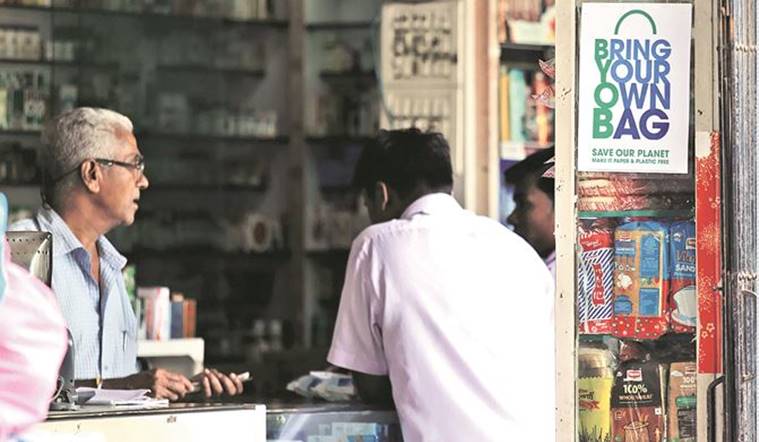 A shopkeeper puts up a board asking customers to bring their own carry bag following a ban on plastic in Worli on Monday. (Nirmal Harindran)
A shopkeeper puts up a board asking customers to bring their own carry bag following a ban on plastic in Worli on Monday. (Nirmal Harindran)
Three weeks after issuing a notification banning various single-use plastic items, including bottles and carry bags, the Maharashtra government on Monday formed one more committee to study the issue. The panel will specifically look at suggestions given by plastic manufacturers regarding its production, use and recycling. The decision to form the secretary-level committee, the fourth panel formed since the ban was imposed on March 23, was taken at a meeting chaired by Chief Minister Devendra Fadnavis on Monday. On the committee are Additional chief secretary to the CM Pravin Pardeshi, additional chief secretary in the Environment Department Satish Gavai, additional chief secretary (Industries) Sunil Porwal and member secretary of the Maharashtra Pollution Control Board P Anbalagan.
Monday’s meeting was also attended by three Shiv Sena leaders — Minister for Environment Ramdas Kadam, Minister for Industries Subhash Desai and Yuva Sena chief Aaditya Thackeray. “The committee will study the feasibility of suggestions given by the plastic manufactures and will report to the High Power Committee headed by me. Then we will take a call on it,” said Kadam, adding that he planned to make available funds worth Rs 2 crore for each district, in order to make cloth bags available as a replacement.
Four associations of plastic manufacturers made a presentation opposing the plastic ban and contending that an extended producers’ responsibility about collection and recycling of plastic waste would suffice to tackle the plastic menace. A source said one of the senior bureaucrats at the meeting was of the opinion that the manufacturers’ suggestion be accepted and a modified notification be issued. The Sena leaders opposed the move on the grounds that accepting the manufacturers’ demands would practically mean rolling back the ban. “Plastic bags below 40 microns were banned in 2005, then those below 50 microns were banned in 2014. What were these manufacturers doing all these years?” asked one of the ministers who attended the meeting.
The manufacturers reportedly suggested at the meeting that they would deploy tempos and people at strategic points such as railway stations, hotels, hospitals for collection of plastic. “One of them also came forward with an alternative of a compostible bag for milk, along with certificates from labs such as Indian Institute of Packaging, an autonomous body of the Ministry of Commerce and Industry, and the Central Pollution Control Board.
On the day the ban came into force, two committees were formed — an Empowered Committee under the chairmanship of the Minister for Environment to monitor the implementation of the ban and an Expert Committee to make recommendations for effective implementation of the ban. Then, in the first week of April, Kadam announced a third committee consisting of 10 members from various associations, including government officials to look into the challenges of implementing the ban.